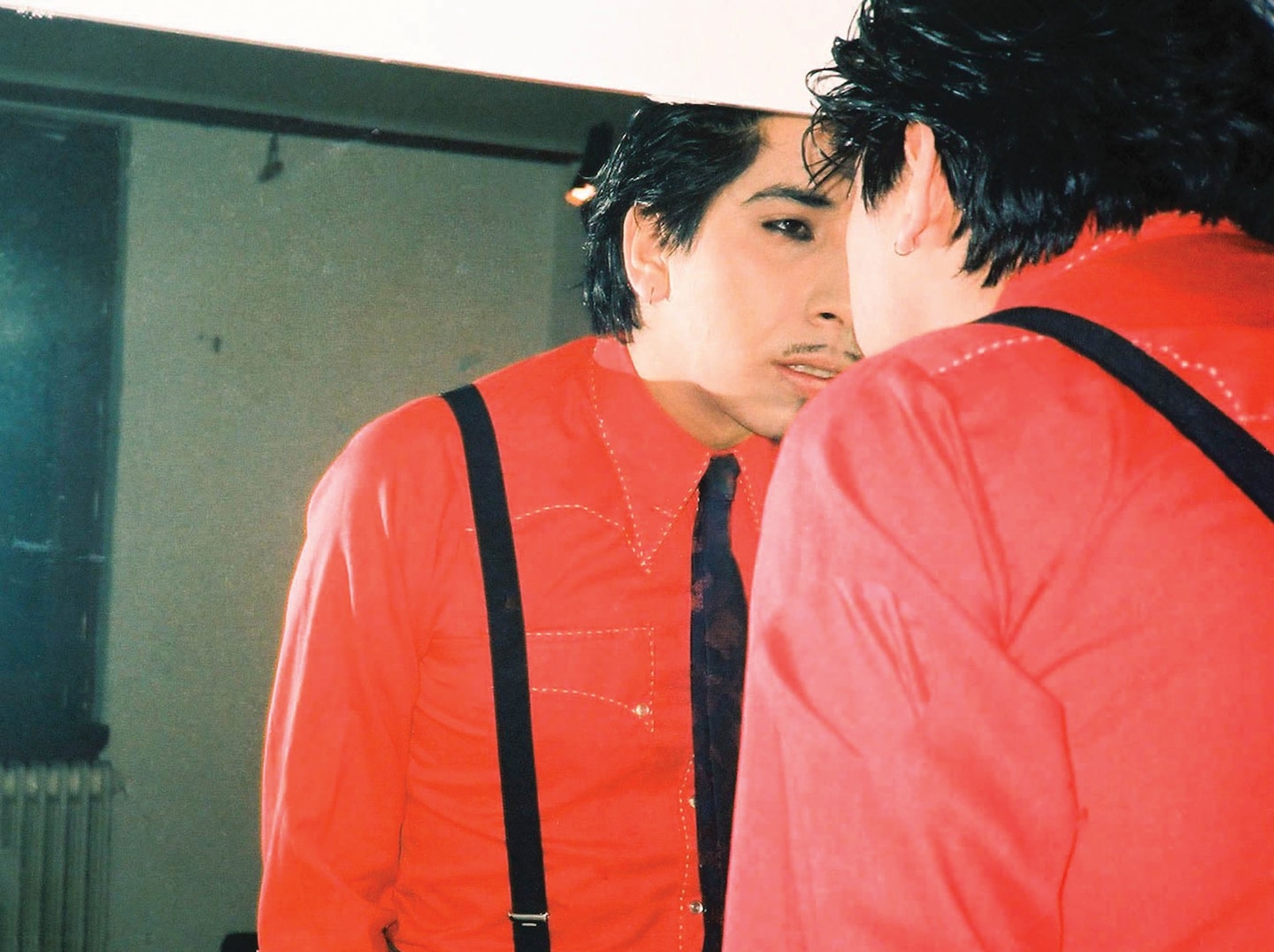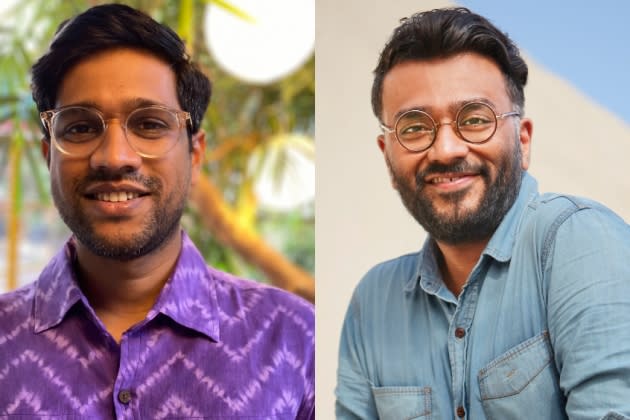
One interesting aspect of this development is that as less attention is paid to guitar heroes, it can help us redefine what it means to be one. If we let go of nostalgia and its stranglehold and embrace an alternate timeline where Sonny Sharrock is as important as Jimmy Page, where Screaming Females’ Marissa Paternoster is the one on posters in Guitar Center, then the list is longer and more representative of the possibilities of sound a guitar can hold. And to that list you might add Kid Congo Powers, a self-described “queer man, Mexican American, Chicano, self-taught, self possessed weirdo” who calls his own playing “an expressionistic blob of sound.”
He’s the guitarist who gave the Cramps’ “New Kind of Kick” its psychedelic siren coda, who co-founded post-punk cult favorites the Gun Club and who played on Nick Cave & The Bad Seeds two late-‘80s gloom-grandeur classics “Tender Prey” and “The Good Son.” Stories of those bands and more are covered in his new memoir, “Some New Kind of Kick,” a whirlwind of discovery and debauchery that is so loaded with iconic scenes and scenesters that it might feel name-droppy if its author didn’t treat his fellow freaks with the same unbridled affection he shows for his more notorious peers.
“I definitely have a very healthy ego, and at the time even more so,” Powers said in a recent interview. “But I also came from being a young fan, and I understood that always. That’s what I always felt like I was, and I still am. Not young, but a young fan inside.”
Born Brian Tristan in La Puente, Calif., in 1959, Kid Congo is what most people would call a “musician’s musician.” If his work and persona are less well-known to the general public, he’s a borderline legend to any artist who has ever tried to fit a mile teased high of jet black hair underneath a cowboy hat. Over the last four decades, the guitarist has, as both sideman and frontman of his own group the Pink Monkey Birds, achieved notoriety as a stylish purveyor of noirish and gritty bonhomie, and amassed an impressive circle of influences (Nick Zinner of Yeah Yeah Yeahs and Jack White among them) based on his texturally inventive but rarely indirect playing.
At 63, Powers still maintains a youthful joie de vivre shaded by the arch sophistication that Cave describes as “a kind of louche sexiness.” As for his playing style, Cave says: “Kid would land that slow open chord on his guitar, playing it with a particular kind of languorous sleaze that was immediately identifiable.”
That style has evolved over the years into something of his own. It’s one part garage/R&B house rockin’ traditionalism and two parts “nonsense that makes a lot of sense,” to use a phrase attributed to one of Powers’s own chief influences, the “no wave” guitarist Pat Place. It’s resulted in Powers being a regular and welcome presence, like a Zelig with agency and riffs, in almost every underground American rock scene of the last five decades, from ’70s glam rock, the birth of punk and the ascendancy of goth, to whatever iteration of the seemingly eternal cycle of garage rock revivals we’re on in 2022.
“I was just someone who put myself in whatever I wanted to be in,” Powers said, attempting to sum up a journey that began with his entry into the music industry as the teenage founder of the Ramones Fan Club in California.
Powers has been writing “Some New Kind of Kick” on and off since 2006. Inspired and encouraged by his longtime friend, the soul DJ and counterculture impresario Jonathan Toubin, who he remembers telling him: “Some people know you did the Cramps. Some people know you did the Gun Club. Some people know you did the Bad Seeds. But a lot of people don’t know you did all those things.”
Sharing some hallmarks of rock bios (notably in its journey from heroin addiction to something akin to serenity), Powers’s memoir — told in a conversational/conspiratorial breeziness influenced, he says, by Cookie Mueller’s “Walking Through Clear Water in a Pool Painted Black” — is less a typical rocker-coming-of-age story than a dream of one, where near-familiar names and faces pop up and pass through as though by Tarot.
Among the book’s tent poles are: the lifelong trauma induced by the murder of a beloved cousin; a spiritual awakening sparked by a tween Powers encountering a proto-goth girl gang waiting in the same line to see the New York Dolls play on “The Midnight Special”; being feted as a teen tastemaker by major-label publicists hoping to eke the Ramones up the next rung of fame; and, at one point, the no wave innovator Lydia Lunch bullying the memoirist into picking up a guitar for the first time and telling to him to just pretend he was playing a Kiss song.
“She was just like, ‘make that s— up right now. Don’t even think about it. Just do it right now,’ ” Powers said. “I say she was screaming at me, but that’s just the way she talks.”
Eventually Powers recounts how he was asked to join the Bad Seeds, arguably the most widely known of his affiliations. Powers writes about his run with the Bad Seeds as largely positive, but also as a time when he put pressure on himself to conform to what he perceived as a hyper-straight and masculine atmosphere within the band.
“Being gay … all your friends knew,” Powers said. “Everyone in your personal life was well aware. And public life was more of a game, or something, to see if people could guess,” he added, discussing how the average music fan in the 1980s might not have any idea of his (or other indie luminaries’) sexuality. “There was a strict taboo against labeling yourself anything beside ‘punk rocker’ or whatever. Part wanting to be mysterious, part being in the closet, part not being labeled as gay, so you could ‘pass,’ I guess is the word. But also not denying it in what you present to the public.”
Asked if he recalls, in any way that Powers might have seemed an outsider at the time, Cave wrote: “I would say that, personally, I was so consumed by the general chaos of my own life and its attendant appetites, not to mention an overinflated regard for my own genius, that Kid’s sexuality was probably the last thing on my mind. It may be that I didn’t know he was gay. I don’t know. I’m not sure it matters. I was drawn to him because he was joyful and funny and possessed a humility toward things that was rare in the Bad Seeds at that time.”
Setting aside to what degree Cave’s knowledge in 1987 of Powers’s sexuality may or may not matter, calling the guitarist “closeted,” in the traditional sense, is an oversimplification.
“I mean … look at me in the Cramps,” Powers said, referring to the stylistic choices he was making while performing songs like “Faster Pussycat” on albums such as one titled “Smell of Female.” “C’mon. Come onnnnn.”
Powers is open about how his politics evolved in the wake of the AIDS epidemic. This sense of duty, as both a Latino and gay man, he believes is one of the reasons he’s written the memoir. The other reason for the memoir is to correct a slightly less universal injustice.
The final chapter of “Some Kind of Kick” depicts a visitation by Jeffrey Lee Pierce, the troubled frontman of the Gun Club, from the astral plane into Powers’s dreamscape kitchen.
“This book is very much about my relationship with Jeffrey,” Powers said, about his nearly 20-year collaboration with the blues punk savant who died at age 37 in 1996. “There’s lots of stories about Jeffery,” the guitarist continued. “And 99.9 percent are about how difficult this man was. To me? I had a friendship. He wasn’t a thing. He was my brother.”
It was Lunch who first put a guitar in his hands, and it was Lux Interior of the Cramps who gave him his moniker, but it was Pierce, and his insistence that Powers learn to play so they could start a band together, that Powers credits for nearly everything else. “The person in front of me looked nothing like a typical punk. … I thought, who is this completely strange creature?” Powers writes of his first impression of Pierce, spotting him in line to see Ohio proto-post-punk powerhouse Pere Ubu. Before the end of the night, the two men had started a band. Near the end of the book, Powers muses whether, if the two had never met, would Powers have ever learned the guitar? Ever played music? Or would he have stayed in college and led a completely different life? “The only thing that matters, that I can even be sure of, is that I met Jeffery,” he concludes.
What also comes through in the book, as in conversation with him, is that Powers remains expansive and humble in the span of his gratitude.
“I’m not a household name, but I make records, and I go around the world and get to express myself the way I want to express myself,” he said. “Those leading lights of those bands are inspiring figures to me to do my own thing. They worked very, very, very hard, and came into a lot of opposition to make it work, and hold it fast … not pandering to outside forces.”
“That is still my credo,” Powers said. “And that’s how I wrote a book.”







